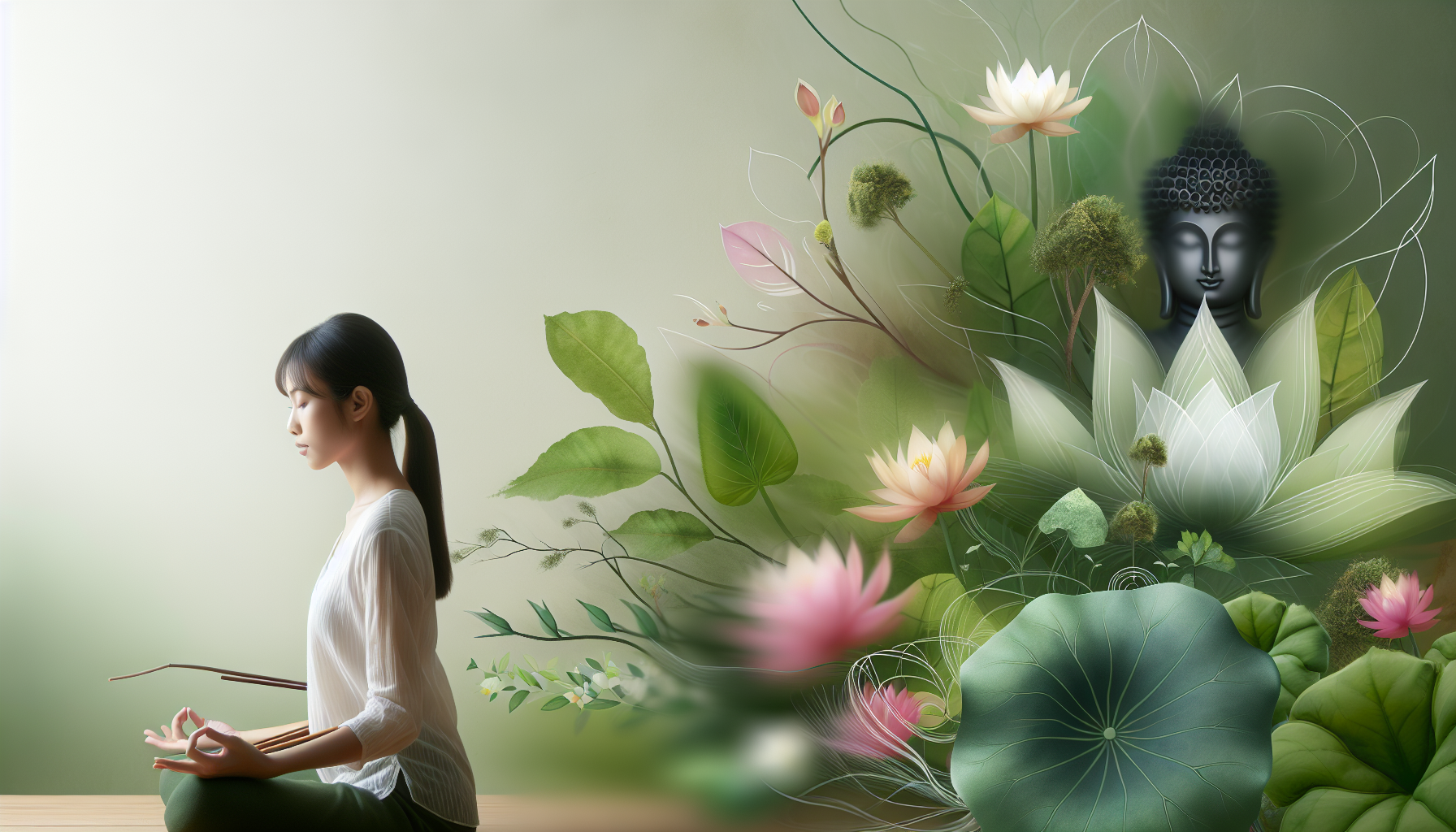Cultivating Empathy and Kindness in a Fast-Paced World

Unlock the power of compassion and transform your daily life with the simple yet profound practice of insight meditation. In today’s fast-paced world, it’s easy to get caught up in our own struggles and forget the importance of empathy and kindness towards others. However, cultivating compassion is not only beneficial for those around us, but it also has a profound impact on our own mental and emotional well-being. By incorporating an insight meditation timer into your daily routine, you can increase feelings of empathy and compassion, leading to more positive and fulfilling relationships.
In this article, we’ll explore the science behind compassion and how meditation can strengthen the neural mechanisms of empathy in the brain. We’ll also delve into the world of insight meditation, its history, and its benefits, and provide practical tips on how to incorporate it into your daily routine. Whether you’re a seasoned meditator or just starting out, you’ll learn how to use an insight meditation timer to cultivate compassion and improve your daily karma.
By the end of this article, you’ll have a deeper understanding of the transformative power of compassion and meditation, and be equipped with the tools and knowledge to start your own practice. So, take a deep breath, get comfortable, and let’s dive into the world of insight meditation and compassion.
1. The Science of Compassion: Understanding the Benefits of Meditation
Research has consistently shown that meditation can have a profound impact on our emotional and mental well-being. One of the most significant benefits of meditation is its ability to increase feelings of compassion and empathy. By cultivating a greater sense of empathy, we can better understand and connect with others, leading to more positive and fulfilling relationships.
Studies have shown that meditation can actually alter the structure and function of the brain, strengthening the neural mechanisms of empathy and compassion. This is achieved through the increased activation of areas such as the anterior cingulate cortex and the insula, which are responsible for emotional regulation and empathy. Furthermore, meditation has been shown to decrease the production of stress hormones such as cortisol, leading to a decrease in anxiety and depression.
In addition to its emotional benefits, meditation has also been shown to have a positive impact on our physical health. By reducing stress and anxiety, meditation can help to lower blood pressure, improve sleep quality, and boost the immune system. By incorporating meditation into our daily routine, we can experience a range of benefits that extend far beyond the meditation cushion itself. Whether you’re looking to improve your relationships, reduce stress, or simply feel more compassionate and empathetic, meditation is a powerful tool that can help you achieve your goals.
The Neuroscience of Empathy: How Meditation Affects the Brain
The neuroscience of empathy is a rapidly growing field of research, and recent studies have shed light on the neural mechanisms that underlie our ability to empathize with others. One of the key findings is that empathy is closely linked to the activity of specific brain regions, including the anterior cingulate cortex (ACC), the insula, and the prefrontal cortex. These regions are responsible for processing emotions, social cognition, and emotional regulation.
Research has shown that meditation can strengthen the connections between these brain regions, leading to increased empathy and compassion. One study published in the journal Social Cognitive and Affective Neuroscience found that long-term meditators showed increased activity in the ACC and insula, areas that are critical for empathy and emotional regulation. Another study published in the journal NeuroImage found that meditation increased gray matter in the prefrontal cortex, an area involved in emotional regulation and social cognition.
The neural mechanisms underlying empathy are complex and multifaceted, but the evidence suggests that meditation can have a profound impact on our ability to connect with others. By strengthening the connections between key brain regions, meditation can increase our empathetic response, leading to more positive and fulfilling relationships. Furthermore, the increased activity in these regions can also lead to improved emotional regulation, reduced stress and anxiety, and a range of other benefits that extend far beyond the meditation cushion itself.
Reducing Stress and Anxiety: The Role of Meditation in Emotional Regulation
Stress and anxiety are ubiquitous in modern life, and can have a profound impact on our emotional and mental well-being. When we’re stuck in a state of stress and anxiety, it’s difficult to cultivate compassion and empathy towards others. However, meditation has been shown to be a powerful tool in reducing stress and anxiety, paving the way for greater emotional awareness and compassion.
Research has consistently shown that meditation can decrease the production of stress hormones such as cortisol, leading to a decrease in anxiety and depression. Meditation has also been shown to increase the activity of neurotransmitters such as serotonin and dopamine, which are involved in mood regulation and emotional well-being. Furthermore, meditation can increase our emotional regulation skills, allowing us to better cope with stressful situations and respond to challenging emotions in a more mindful and compassionate way.
By reducing stress and anxiety, meditation can help us cultivate a greater sense of emotional awareness and compassion towards ourselves and others. When we’re not stuck in a state of stress and reactivity, we’re able to respond to situations in a more thoughtful and intentional way, leading to more positive and fulfilling relationships. Whether you’re looking to reduce stress and anxiety, or simply cultivate more compassion and emotional awareness, meditation is a powerful tool that can help you achieve your goals.
2. What is Insight Meditation? An Introduction to Mindfulness Practice

Insight meditation, also known as Vipassana meditation, is a mindfulness practice that originated in ancient India and was popularized in the Western world by Buddhist teachers such as S.N. Goenka and Joseph Goldstein. The practice involves cultivating awareness of the present moment, without judgment or attachment, and is often practiced through focusing on the breath, body sensations, or emotions. Insight meditation aims to develop wisdom and understanding of the true nature of reality, leading to a deeper sense of peace, compassion, and freedom.
The benefits of insight meditation are numerous, and include reduced stress and anxiety, improved emotional regulation, and increased feelings of compassion and empathy. Regular practice can also lead to greater self-awareness, improved relationships, and a greater sense of overall well-being. Insight meditation can be practiced by anyone, regardless of their background or beliefs, and can be incorporated into daily life in a variety of ways, from short daily sittings to longer retreats and workshops.
Incorporating insight meditation into your daily routine can be as simple as setting aside a few minutes each day to sit comfortably, focus on your breath, and observe your thoughts and emotions without judgment. You can also try incorporating mindfulness into your daily activities, such as eating or walking, to cultivate a greater sense of awareness and presence. With regular practice, you can experience the many benefits of insight meditation and cultivate a greater sense of peace, compassion, and wisdom in your daily life.
The Roots of Insight Meditation: A Brief History
Insight meditation, also known as Vipassana meditation, has its roots in ancient Buddhist tradition. The practice is believed to have originated over 2,500 years ago, during the time of the Buddha himself. The Buddha taught that the path to enlightenment lay in the development of mindfulness and wisdom, and that insight meditation was a key component of this path. In the early Buddhist texts, such as the Pali Canon, the Buddha is often depicted as teaching mindfulness and insight meditation to his followers.
In the centuries that followed, insight meditation spread throughout the Buddhist world, and was practiced by monks and nuns in monasteries and temples throughout India, Sri Lanka, and Southeast Asia. The practice was often combined with other Buddhist practices, such as loving-kindness meditation and concentration meditation, to form a comprehensive system of spiritual development. Over time, different schools of Buddhism developed their own unique approaches to insight meditation, but the core principles of the practice remained the same.
In the 20th century, insight meditation began to be introduced to the Western world, through the efforts of Buddhist teachers such as S.N. Goenka and Joseph Goldstein. Today, insight meditation is practiced by people all over the world, and is often adapted to fit the needs of modern life. Despite its evolution, however, the core principles of insight meditation remain rooted in the ancient Buddhist tradition, and continue to offer a powerful path to wisdom, compassion, and awakening.
Mindfulness in Daily Life: Tips for Starting Your Insight Meditation Practice
Starting an insight meditation practice can be as simple as finding a quiet and comfortable space to sit and focus on your breath. It’s essential to find a space that is free from distractions, such as a quiet room in your home or a peaceful outdoor spot. You can also consider using a meditation cushion or chair to support your back and help you maintain a comfortable seated position. Once you’ve found a suitable space, take a few deep breaths and begin to focus on your breath, noticing the sensation of the air moving in and out of your body.
For beginners, guided meditations can be a helpful tool to get started with insight meditation. You can find guided meditations online or through mobile apps, such as Headspace or Calm, that offer gentle guidance and support as you begin your practice. Start with short sessions, such as 5-10 minutes, and gradually increase the length of your practice as you become more comfortable with the technique. Remember, the goal of insight meditation isn’t to achieve a specific state or feeling, but rather to cultivate awareness and understanding of the present moment.
As you continue to develop your insight meditation practice, remember to be patient and kind to yourself. It’s normal for the mind to wander, and it’s okay if you find yourself getting distracted or feeling frustrated. Gently bring your attention back to your breath, and remember that the practice is about cultivating awareness and understanding, not about achieving a specific state or feeling. With regular practice, you can develop a greater sense of mindfulness and awareness in your daily life, and experience the many benefits that insight meditation has to offer.
3. The Power of Daily Karma Checks: How Meditation Can Transform Your Life
Incorporating an insight meditation timer into your daily routine can have a profound impact on your life. By dedicating just a few minutes each day to mindfulness and meditation, you can cultivate greater self-awareness, compassion, and positive karma. A daily meditation practice can help you develop a greater understanding of your thoughts, emotions, and behaviors, allowing you to make more intentional choices and live a more authentic life. Additionally, regular meditation can increase feelings of empathy and compassion, leading to more positive and harmonious relationships.
As you establish a daily meditation practice, you may find that you begin to notice subtle shifts in your behavior and interactions with others. You may find yourself responding to challenging situations with greater calm and wisdom, and engaging in more thoughtful and compassionate communication. This, in turn, can lead to a greater sense of positive karma, as you cultivate a more loving and respectful relationship with yourself and others. By incorporating an insight meditation timer into your daily routine, you can harness the power of mindfulness and meditation to transform your life and create a more positive and compassionate world.
The benefits of a daily meditation practice are numerous, and can extend far beyond the meditation cushion itself. By cultivating greater self-awareness, compassion, and positive karma, you can experience greater joy, peace, and fulfillment in your daily life. You can also develop a greater sense of connection and understanding with others, leading to more positive and harmonious relationships. Whether you’re seeking to improve your mental and emotional well-being, or simply to cultivate a greater sense of awareness and compassion, a daily meditation practice can be a powerful tool to help you achieve your goals.
The Concept of Karma: Understanding Cause and Effect
The concept of karma is a fundamental principle in many Eastern spiritual traditions, including Buddhism and Hinduism. At its core, karma refers to the idea that our actions, thoughts, and intentions have consequences, and that the energy we put out into the world comes back to us in some form. This concept is often understood in terms of cause and effect, where our actions and choices are seen as the causes that bring about specific effects in our lives. In the context of meditation and daily life, the concept of karma invites us to consider the intentions and motivations behind our actions, and to cultivate a greater sense of awareness and responsibility for our impact on the world.
In meditation, the concept of karma can be applied by paying attention to our thoughts and intentions, and by cultivating a greater sense of awareness and compassion. By recognizing the interconnectedness of all things, we can begin to see how our actions and choices affect not only ourselves, but also those around us. This can lead to a greater sense of empathy and understanding, and can inspire us to make more intentional and compassionate choices in our daily lives. By understanding the concept of karma, we can begin to live more mindfully and with a greater sense of purpose, and can cultivate a more positive and harmonious relationship with ourselves and the world around us.
The concept of karma is not limited to meditation and spirituality, but can also be applied to our daily lives. By recognizing the consequences of our actions, we can begin to make more intentional choices that align with our values and goals. This can lead to a greater sense of purpose and fulfillment, and can help us to cultivate more positive and harmonious relationships with others. Whether in meditation or daily life, the concept of karma invites us to consider the impact of our actions and to cultivate a greater sense of awareness, compassion, and responsibility.
Cultivating Compassion: How Meditation Can Improve Your Relationships
Meditation is a powerful tool for cultivating compassion and improving relationships. By developing a greater sense of empathy and understanding, meditation can help us to connect with others on a deeper level. When we practice meditation, we cultivate a greater sense of awareness and compassion, which can lead to more positive and fulfilling relationships. We begin to see others as they truly are, rather than through the lens of our own biases and assumptions. This can lead to greater understanding, empathy, and connection with others.
Meditation can also help us to develop a greater sense of patience and tolerance, which is essential for building strong and healthy relationships. When we are able to approach others with a sense of calm and compassion, we are more likely to respond to challenging situations with wisdom and understanding. This can lead to greater harmony and understanding in our relationships, and can help us to build stronger and more meaningful connections with others. By cultivating compassion and empathy through meditation, we can create a more positive and loving environment in our relationships.
In addition to improving our relationships with others, meditation can also help us to cultivate a greater sense of self-compassion. When we practice meditation, we develop a greater sense of kindness and understanding towards ourselves, which can lead to greater confidence and self-esteem. This, in turn, can lead to greater success and fulfillment in our personal and professional lives. By cultivating compassion and empathy through meditation, we can create a more positive and loving environment in our relationships, and can lead happier, healthier, and more fulfilling lives.
4. Using an Insight Meditation Timer for Daily Karma Checks
Using an insight meditation timer can be a powerful way to cultivate compassion and improve your daily karma. One of the most effective ways to use an insight meditation timer is to set it for a specific amount of time each day, such as 10 or 20 minutes, and commit to practicing meditation during that time. This can help you establish a consistent meditation practice and make it easier to fit into your daily routine. Additionally, you can use the timer to guide your meditation practice, focusing on your breath or a mantra during the timed period.
Another way to use an insight meditation timer is to set it for shorter intervals throughout the day, such as 5 or 10 minutes. This can help you take regular breaks and practice mindfulness and compassion throughout the day. You can use the timer to remind yourself to take a few deep breaths, focus on your body and emotions, and cultivate a sense of kindness and understanding towards yourself and others. By incorporating regular meditation practice into your daily routine, you can cultivate a greater sense of compassion and improve your daily karma.
When using an insight meditation timer, it’s also important to set an intention for your practice. This can help you focus your meditation and cultivate a greater sense of compassion and kindness. For example, you can set an intention to cultivate compassion towards yourself and others, or to improve your relationships with others. By setting an intention and using an insight meditation timer, you can create a powerful and effective meditation practice that helps you cultivate compassion and improve your daily karma.
Setting Your Intention: How to Use a Meditation Timer Effectively
Setting your intention is a crucial step in creating a meditation practice that works for you. When you set an intention, you clarify what you want to achieve or focus on during your meditation practice. This can help you stay focused and motivated, and ensure that you get the most out of your practice. To set your intention, start by asking yourself what you want to achieve through your meditation practice. Do you want to reduce stress and anxiety, improve your sleep, or increase your focus and productivity? Once you have a clear idea of what you want to achieve, you can set a specific intention for your practice.
When setting your intention, it’s important to make it specific, measurable, and achievable. For example, instead of setting a vague intention to “be more mindful,” you could set a specific intention to “focus on my breath for 10 minutes without getting distracted.” You can also use a mantra or a phrase to help you stay focused and motivated. For example, you could use a mantra like “I am calm and relaxed” to help you stay centered and focused.
Using a meditation timer can help you stay on track and ensure that you’re meeting your intention. By setting a timer for a specific amount of time, you can create a sense of accountability and motivation. You can also use a meditation timer to track your progress and adjust your intention as needed. For example, if you find that you’re getting distracted during your meditation practice, you can adjust your intention to focus on a specific aspect of your practice, such as your breath or body sensations. By setting your intention and using a meditation timer, you can create a meditation practice that works for you and helps you achieve your goals.
Overcoming Distractions: Tips for Staying Focused During Meditation
One of the biggest challenges of meditation is overcoming distractions. Whether it’s a noisy environment, a wandering mind, or physical discomfort, distractions can make it difficult to stay focused and get the most out of your meditation practice. The first step in overcoming distractions is to identify the sources of distraction. Are you meditating in a noisy environment? Do you have a racing mind or aching body? Once you’ve identified the sources of distraction, you can start to develop strategies for overcoming them.
One effective strategy for overcoming distractions is to create a conducive meditation environment. This can include finding a quiet and comfortable space to meditate, using earplugs or meditation music to block out noise, and using a meditation cushion or chair to support your body. You can also try using a meditation app or guided meditation to help you stay focused. Additionally, developing a pre-meditation routine, such as taking a few deep breaths or doing some light stretching, can help you transition into a meditative state and reduce distractions.
Another key strategy for overcoming distractions is to cultivate mindfulness and awareness. When you notice your mind starting to wander, gently bring your attention back to your breath or meditation object. Don’t try to force your mind to stay focused, but rather allow yourself to gently come back to the present moment. With regular practice, you’ll find that you’re able to stay focused for longer periods of time and overcome distractions more easily. Remember, the goal of meditation isn’t to achieve a perfect state of focus, but rather to cultivate awareness and kindness towards yourself and others.
5. Conclusion: The Transformative Power of Compassion and Meditation
Incorporating an insight meditation timer into your daily routine can have a transformative impact on your life. By cultivating compassion and kindness towards yourself and others, you can improve your mental and emotional well-being, strengthen your relationships, and increase your sense of empathy and understanding. Regular meditation practice can also help you develop a greater sense of self-awareness, reduce stress and anxiety, and improve your overall quality of life.
By using an insight meditation timer, you can create a consistent and effective meditation practice that helps you achieve your goals. Whether you’re looking to improve your relationships, reduce stress and anxiety, or simply cultivate a greater sense of compassion and empathy, an insight meditation timer can help you stay on track and achieve your goals. By incorporating meditation into your daily routine, you can create a more positive and loving environment in your life and improve your karma.
As you continue to cultivate compassion and improve your karma, remember to be patient and kind to yourself. Developing a meditation practice takes time and effort, and it’s okay to encounter obstacles and challenges along the way. By staying committed to your practice and continuing to cultivate compassion and empathy, you can create a more positive and loving environment in your life and achieve a deeper sense of transformation and growth.
The Future of Compassion: How Meditation Can Create a More Empathetic World
As we look to the future, it’s clear that meditation has the potential to create a more empathetic and compassionate world. By cultivating compassion and empathy in individuals, meditation can have a ripple effect on communities and societies, leading to greater understanding and connection. Imagine a world where leaders and policymakers make decisions based on empathy and compassion, rather than self-interest and greed. Imagine a world where conflicts are resolved through dialogue and understanding, rather than violence and aggression.
The potential impact of meditation on global compassion and empathy is vast. By reducing stress and anxiety, meditation can help to reduce conflict and violence. By increasing empathy and understanding, meditation can help to build bridges between communities and cultures. By cultivating a sense of connection and interdependence, meditation can help to create a more harmonious and peaceful world. As more and more people begin to practice meditation, we can expect to see a shift in global consciousness, towards a more compassionate and empathetic world.
The future of compassion is bright, and meditation is at the forefront of this movement. By incorporating meditation into our daily lives, we can become part of a larger movement towards a more empathetic and compassionate world. We can use meditation to cultivate compassion and empathy, and to create a better world for all. The potential is vast, and the impact is already being felt. As we move forward, let us continue to cultivate compassion and empathy, and to create a more loving and peaceful world.
Next Steps: Continuing Your Journey of Compassion and Self-Discovery
Now that you’ve started your meditation practice, it’s time to take it to the next level. Continuing to cultivate compassion and self-awareness in your daily life requires commitment, patience, and persistence. Here are some resources and tips to help you on your journey. Start by setting aside a regular time each day to meditate, even if it’s just for a few minutes. Consistency is key to developing a strong meditation practice.
In addition to your daily meditation practice, try to incorporate mindfulness and compassion into your daily activities. This can be as simple as taking a few deep breaths before responding to a difficult situation, or practicing active listening with a friend or loved one. You can also try incorporating loving-kindness meditation into your practice, focusing on sending kindness and compassion to yourself and others.
Remember, cultivating compassion and self-awareness is a lifelong journey, and it’s okay to take it one step at a time. Don’t be discouraged if you encounter setbacks or difficulties along the way – simply acknowledge them and gently bring your attention back to your practice. With time and patience, you’ll find that your meditation practice becomes an integral part of your daily life, and that you’re more equipped to handle life’s challenges with kindness, compassion, and understanding.
What is the best way to start a meditation practice?
The best way to start a meditation practice is to start small and be consistent. Begin with short sessions of 5-10 minutes a day and gradually increase the duration as you become more comfortable with the practice.
How can I stay motivated to meditate regularly?
Staying motivated to meditate regularly can be achieved by setting a specific goal, such as meditating for a certain number of days in a row, and rewarding yourself when you reach it. You can also find a meditation buddy or join a meditation group to stay accountable.
What are some common obstacles to meditation and how can I overcome them?
Common obstacles to meditation include a busy mind, physical discomfort, and difficulty staying focused. To overcome these obstacles, try to focus on your breath, use a meditation app or guided meditation, and find a comfortable and quiet space to meditate.
How can I apply the principles of compassion and empathy in my daily life?
You can apply the principles of compassion and empathy in your daily life by practicing active listening, being kind and understanding towards others, and taking a few moments each day to reflect on how you can show compassion to yourself and others.
What are some additional resources for learning more about meditation and compassion?
Some additional resources for learning more about meditation and compassion include books such as ‘Mindfulness in Plain English’ and ‘The Power of Now’, as well as online courses and meditation apps like Headspace and Calm.




